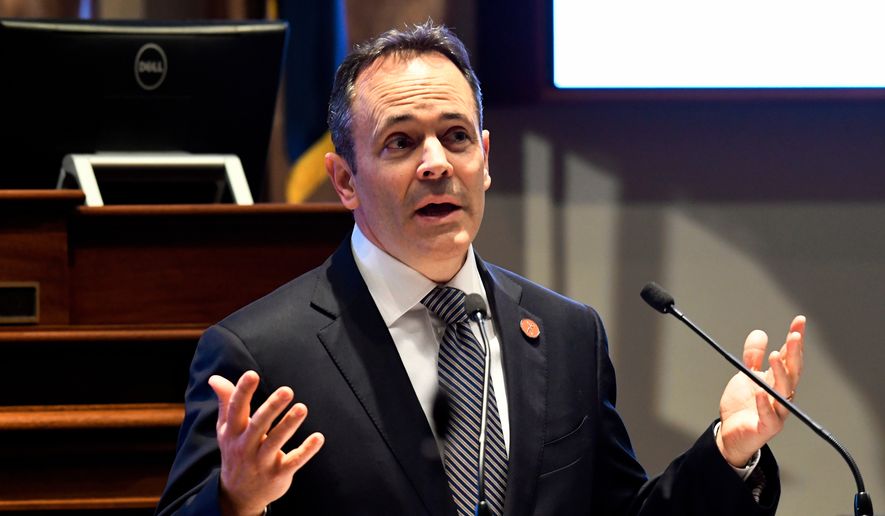Faith-based groups have an important role to play in clearing the backlog of foster children waiting to be placed with loving families, analysts say, yet several liberal jurisdictions have moved recently to create a barrier between faith and adoption.
In California, Massachusetts, Illinois, Philadelphia and the District of Columbia, adoption agencies have been forced to shut their doors because of their conviction that children should be placed with a mother and a father.
Kentucky Gov. Matt Bevin said social science has shown consistently that children fare best when they are raised by a mother and father who stay together throughout the child’s upbringing.
“Every kid wants a father and a mother,” Mr. Bevin, a Republican, said Wednesday at The Heritage Foundation. “The idea that we need to protect our children from that is absurd. This idea that we need to be worried about certain organizations making that as an option for kids exclusive of some other option, and that’s somehow detrimental.”
About 440,000 children are in foster care, and about 100,000 of them are waiting to be adopted.
The number of children in foster care is up 10 percent since 2012, according to the annual report from the Adoption and Foster Care Analysis and Reporting System. Analysts say the uptick has been driven by the opioid crisis.
The Heritage Foundation released a report last month that showed faith-based adoption agencies are particularly effective at placing foster children with families.
For instance, a Christian organization named The CALL has recruited almost half of the foster families in Arkansas by tapping into a network of hundreds of churches. In Colorado, Focus on the Family has helped to halve the backlog of children waiting to be adopted.
Faith-based adoption agencies also excel at placing difficult children into families, the report found, with Catholic Charities reporting that 45 percent of its adoptions in 2016 were of children with special needs.
Jedd Medefind, president of the Christian Alliance for Orphans, said faith motivates all sorts of altruistic behavior, such as donating to charity, volunteering and giving blood. He said faith-based agencies are so effective because they tap into communities predisposed toward adoption.
“If we are serious about addressing the world’s great needs,” Mr. Medefind said, “then we absolutely need faith-based organizations and faith-motivated individuals to be a part of that.”
Last month, Catholic Social Services sued Philadelphia after the city announced it would terminate its contract with the agency at the end of June.
“Despite a foster care crisis and a need for more foster homes, the City of Philadelphia has decided to cut off foster placements for Catholic Social Services and prioritize political grandstanding over the needs of children,” read the complaint filed by the Becket Fund for Religious Liberty.
Last year, the American Civil Liberties Union sued the Michigan Department of Health and Human Services for contracting with faith-based adoption agencies that refused to place children houses headed by same-sex couples.
The lawsuit called on a federal court to strike down a law passed in June of 2015 to prevent the government from discriminating against religious adoption agencies. The legislation was enacted weeks before Obergefell v. Hodges, the U.S. Supreme Court ruling that created a constitutional right to same-sex marriage.
One of the agencies named in the complaint is St. Vincent’s Catholic Charities in Lansing, which told a lesbian couple in 2016 that it “does not work with same-sex couples,” according to the lawsuit.
St. Vincent’s specializes in placing large groups of siblings and teenagers into families. Shamber Flore, 20, and her siblings were adopted by a family through the Catholic agency in 2005. Writing in the pages of the Detroit News, Mr. Flore said St. Vincent’s saved her life.
“Most of the children in St. Vincent’s care are minority children, and it excels in providing extra support for families with special needs children and finding homes for especially hard to place kids like teens or larger sibling groups like mine,” Ms. Flore wrote in March. “And because of its faith-based mission, St. Vincent can reach different segments of the population, recruiting families like my mom and dad who would not have adopted with another agency.”
Governments at the state and federal levels have moved to protect religious adoption agencies.
Last month, Kansas and Oklahoma joined seven other states with laws protecting the right of faith-based child welfare providers to contract with the government without violating their religious beliefs.
Legislation introduced in both houses of Congress, by Republican Sen. Mike Enzi of Wyoming and Republican Rep. Mike Kelly of Pennsylvania, would prohibit the federal government and state governments that receive certain federal funding from disqualifying adoption agencies from government programs because of their faith.
The Child Welfare Provider Inclusion Act would “restore government to a neutral position with regard to religion, where they would not be allowed to discriminate against any agency because of their religious belief,” said Emile Kao, director of the Richard and Helen DeVos Center at The Heritage Foundation.
Eighty members of Congress also signed a letter last month urged President Trump to protect adoption agencies being persecuted for their religious beliefs.
“Unfortunately, the unimaginable is happening and faith-based child welfare organizations are being targeted, bullied, and silenced across the country,” the letter read. “We urge your support and swift action to protect these organizations who serve our children.”
Mr. Medefind said adoption carries a special significance among Christians who see it as a reflection of God’s love for his people.
“This is actually how God first loved us,” he said. “That when we were in great need of and alone, that he welcomed us into his family. And so we see what we’re doing just a small reflection of the way that we have first been loved.”
• Bradford Richardson can be reached at brichardson@washingtontimes.com.




Please read our comment policy before commenting.